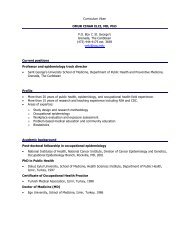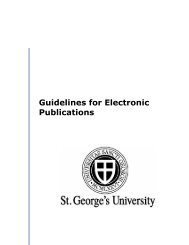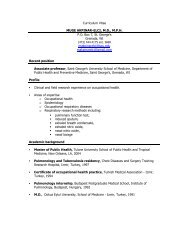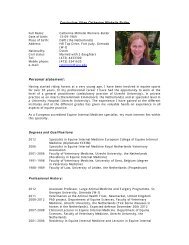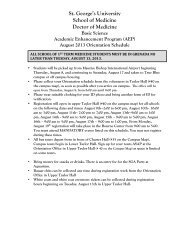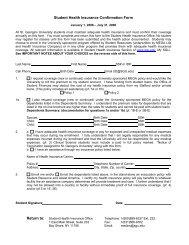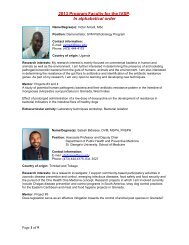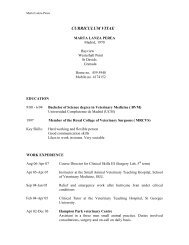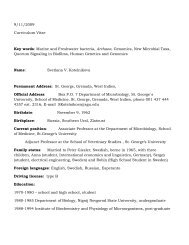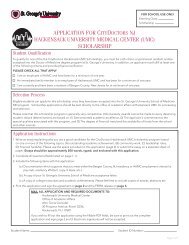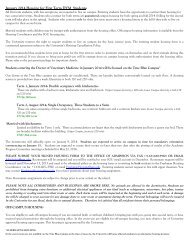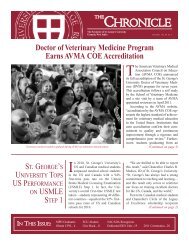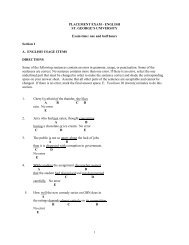SCHOOL OF 2012-2013 - St. George's University
SCHOOL OF 2012-2013 - St. George's University
SCHOOL OF 2012-2013 - St. George's University
Create successful ePaper yourself
Turn your PDF publications into a flip-book with our unique Google optimized e-Paper software.
School of Medicine<br />
Course Descriptions<br />
instruction is completed with medical students enrolled in<br />
Medical Immunology (MICR 580).<br />
MICR 829<br />
Current Topics in Immunology<br />
This is a one-credit course that includes extensive literature<br />
research with the option of either two ten-page essays<br />
on two different topics or one 20-page essay on one<br />
topic based on researched material. Irrespective of the<br />
option selected, students must present one 45-minute<br />
PowerPoint presentation (followed by an oral questionand-answer<br />
session) on one of the selected research topics.<br />
Evaluation will be based on the essays, the PowerPoint<br />
presentation, and the ability to answer oral questions after<br />
the PowerPoint presentation.<br />
MICR 831<br />
Microbiology Teaching Practicum<br />
Not less than 30 hours per term of direct contact teaching<br />
in laboratories, small group sessions, and/or lecture in<br />
ongoing regular courses conducted by the department.<br />
This may take place at undergraduate, graduate, and/<br />
or professional levels. All contact shall be under direct<br />
personal supervision of departmental faculty.<br />
MICR 901<br />
Graduate Seminars in Microbiology<br />
This is an ongoing seminar series. Registration and<br />
participation every term is required for all students while in<br />
residence for the MSc and PhD programs in Microbiology.<br />
In this series, students and faculty present reports on<br />
current topics. Credit students must organize and present<br />
at least one one-hour seminar per term and attend all other<br />
seminars to receive credit. Permanent, as well as visiting<br />
faculty, shall also present. This course is repeatable up to<br />
nine terms for cumulative credit. Graduate students are<br />
expected to enroll in this course repeatedly—a minimum of<br />
three times for freestanding MSc students and a minimum<br />
of four times for PhD students.<br />
MICR 920<br />
Research in Microbiology for MSc<br />
<strong>St</strong>udents shall conduct research on a topic approved by<br />
their graduate supervisory committee for the MSc thesis.<br />
MICR 980<br />
Research in Microbiology for PhD<br />
<strong>St</strong>udents shall conduct research on a topic approved<br />
by their graduate supervisory committee for their PhD<br />
dissertations.<br />
MICR 990<br />
Master’s Thesis in Microbiology<br />
<strong>St</strong>udents shall prepare and submit an original thesis, which<br />
must be defended before the microbiology faculty and<br />
invited guests. This course cannot be repeated for credit.<br />
This course may be offered by different instructors and/<br />
or faculty members engaged in research and willing to<br />
supervise students.<br />
MICR 991<br />
Doctoral Dissertation in Microbiology<br />
<strong>St</strong>udents shall prepare and submit an original dissertation,<br />
which must be defended before the microbiology faculty<br />
and invited guests. This course cannot be repeated for<br />
credit.<br />
Interdepartmental Courses<br />
IDGS 804<br />
Biology of Aging<br />
This course examines theories of aging, the physiological<br />
and pathophysiological aspects of aging, cellular and<br />
extracellular aspects of aging, organ system changes, goals<br />
of gerontology, and predictors for increased longevity.<br />
IDGS 805<br />
Community Health<br />
This course is designed to provide an understanding of the<br />
basic sciences in relation to the practice of medicine. The<br />
course will allow students to apply clinical skills developed<br />
in their preclinical studies to real-life situations, and thus<br />
provide a smooth transition from preclinical to clinical<br />
studies. The program allows students to improve their<br />
abilities in patient interviews, history taking, and physical<br />
and laboratory diagnosis, as well as therapeutics.<br />
IDGS 806<br />
Critical Appraisal of Research <strong>St</strong>udies<br />
By the end of the course, students will be able to critically<br />
appraise observational and intervention studies in humans,<br />
and describe the principles of research synthesis using<br />
examples from human parasitic infections. This course<br />
includes preparatory reading, lectures, group/individual<br />
work, seminars, discussions, and preparation of a four-page<br />
policy brief.<br />
82 | <strong>St</strong>. George’s <strong>University</strong>



